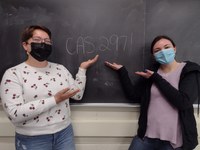
 Spring 2019: Rhetoric and Activism in Public Education
Spring 2019: Rhetoric and Activism in Public EducationIn the past year, educational advocacy has reached a high tide. From West Virginia to Washington, teachers went on strike to demand better school funding. Survivors of a mass shooting at Florida’s Parkland High School led national student walkouts for gun control legislation. A flood of public school teachers launched successful campaigns for local, state, and federal elections. In courtrooms across the country, students mounted lawsuits against their school systems to assert a constitutional right to literacy. And on football sidelines and campus quads, student protesters challenged unjust institutions. In these and countless more cases, students and teachers moved beyond the walls of the classroom to assert their agency in the broader public sphere.
In CAS 478, students will study the rhetorical landscape of educational activism in the United States. More specifically, they will examine how educational actors—teachers and students—exert agency as participants in public discourse. Situated at the nexus of democratic ideals, the demands of the marketplace, and radical pedagogic potential, educational actors face a unique set of constraints and possibilities when they take up the banner of protest. When they speak, they must grapple with a range of social myths regarding the autonomy of students, the sacrifices of teachers, and the relationship of school to society. To understand how educational actors navigate their peculiar position, this class draws upon the insights of rhetorical scholarship regarding social activism, labor movements, and education policy. Over the semester, topics will encompass the intertwined traditions of civil rights and public schools, the ethical quandaries posed by teacher/student walkouts, and pervasive anxieties about students’ exercise of free speech.
